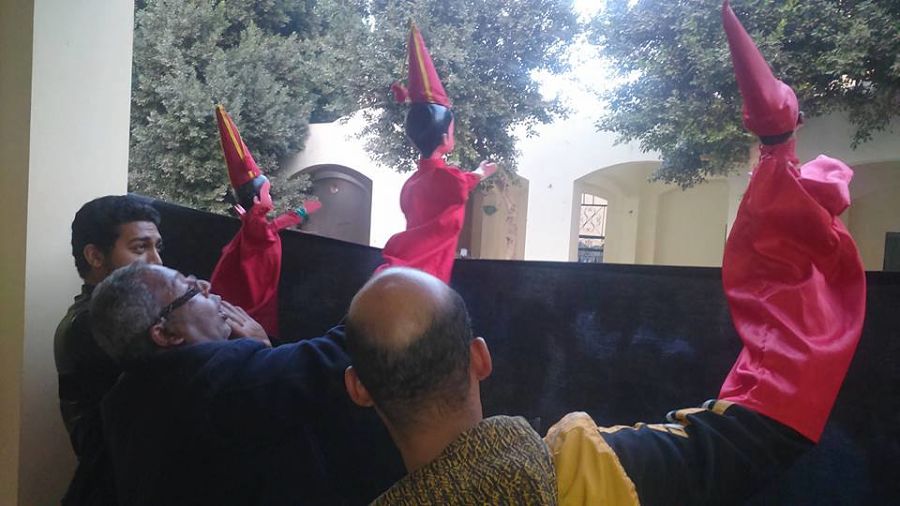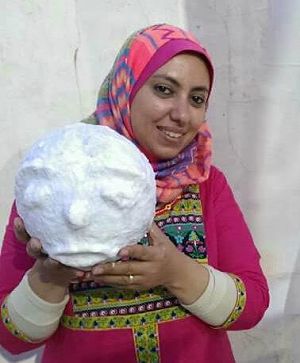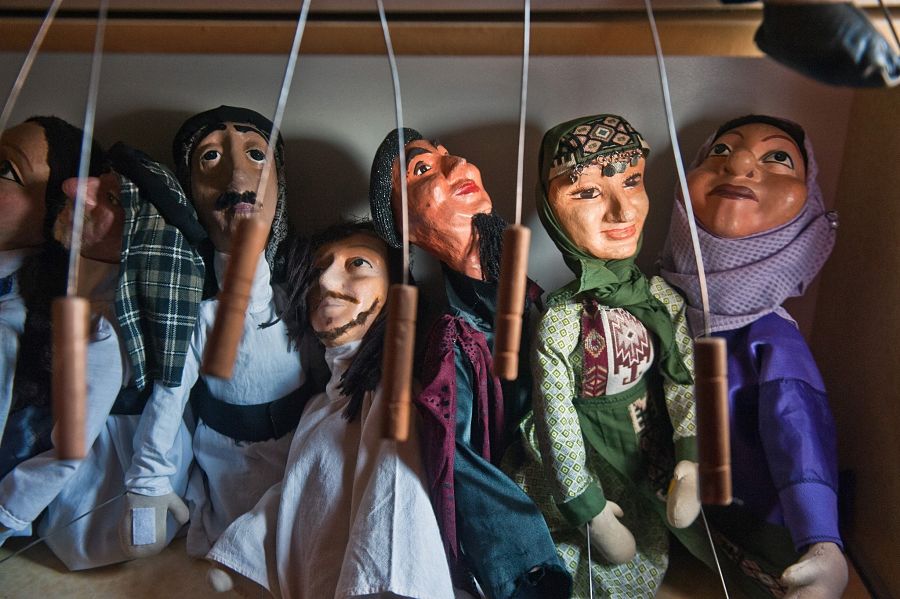Aiming to revive the art of puppetry, reach more audiences, and bridge the gaps among puppeteers worldwide without being hindered by financial constraints, in March members of an independent Egyptian puppet theatre troupe launched the first Online World Puppet Theater Festival, allowing thousands of audiences to enjoy puppet shows from all over the world.
With 37 performances from 19 different countries, the festival kicked off in Egypt on March 1 and ran for a whole month, showing performances from Egypt, Russia, Germany, Iran, United Arab Emirates, Algeria, India, Brazil, Tunisia, and Turkey, among other places. The festival was an excellent solution for many Egyptian artists, who struggle every day for travel funds to participate at international festivals and show their works abroad. Through the past decade, there had been several attempts to host a festival for puppet theatre in Egypt which foundered on finances.
“I thought of gathering many puppeteers from around the world without having to search for funding to sponsor flight tickets or accommodation,” said Mohamed Fawzy, the head of the festival and founder of Kayan Marionette Independent Theatre Troupe. “I thought of making use of social media, especially when Facebook added the ‘live’ feature, which allows any person from any country to publish a live video and be seen by people worldwide.”
Fawzy, originally a theatre director and actor, established his troupe in 2011 after the revolution which toppled former president Hosni Mubarak after 30 years of his rule. Fawzy’s goal: to help artists interested in puppetry improve their skills and learn new techniques. What was missing, though, was a way for their work to be seen.
“The puppet art needed new technology that can spread it all over the world,” said Fawzy. “We launched the festival because we wanted to reach people who like to see puppetry but don’t know where to find it. We also wanted to make a network that could gather puppeteers and make it easy for them to show their works to audiences from different cultures.”
Fawzy said that the puppet performances that were part of the festival, which varied in length from 6 to 80 minutes, racked up more than 95,000 views during the festival month from all over the world.
While the Cairo Puppet Theatre, established in 1959 and located in downtown Cairo, is considered the largest puppet theatre in the Arab world, there have been no international puppetry festivals in Egypt that might expose its art to the wider world, and bring the latest international puppetry to Egypt. Instead the theatre typically hosts state-funded local productions for children.
“Puppetry keeps developing, and we should have a look at what other puppeteers in other countries do,” Fawzy said. “That’s why we needed an international festival.”
The festival, launched by personal funding, gained support from different institutions, including the Egyptian Actors’ Syndicate, headed by Ashraf Zaki; Darb 1718, a cultural center in Cairo; and the Union Internationale De La Marionnette (UNIMA).

Nirouz el-Tanbouli, an Egyptian writer and fine artist based in the United Arab Emirates, was a participant in the online festival. She presented two performances: Al-Hayat Molawana (Life is Colorful), an Arabic-language performance, and Waka Waka, a dance show. Life is Colorful featured puppets that El-Tanbouli created with such recycled materials as newspapers and clothes hangers, as it told the story of Samer, a blind boy whose friend, Ahmed, tries to describe the colors to him.
“The performance aims at integrating blind children into society, and at the same time raising awareness among other children to know more about their friends with special needs,” said el-Tanbouli, who broadcasted her performance from UAE.

El-Tanbouli added that she is enthusiastic about the puppet festival, as it helps to revive an ancient art that was once widely practiced in Egypt. The most famous puppet in Egypt is the Aragouz, a wooden puppet with red clothes, which some scholars date back to the 15th century, and which has been used in street shows that tackle political or social issues in a satirical way.
“Our children are deprived of watching puppets as they become more open to the computers, internet, and electronic games, which disable their positive imagination,” said el-Tanbouli. “That’s why I won’t ever delay in participating in a festival that revives the art of puppetry in Egypt.”
One of the emotional performances presented during the festival was The Miracle of the Scarlet Sails, a wordless show by Evgeny Solovyev and Yulia Rikhter of Russia’s Teatrol-theater. The show was presented on a small rectangular theatre with a mobile set, where the puppeteers appear in front of a black background moving their small, human-like puppets. Based on Russian writer Alexander Grin’s romantic novel Scarlet Sails, the show tells the story of Longren, a former seaman who raises his daughter alone after losing his beloved wife. Longren earns his daily bread by selling toy boats he makes from wood.
“We hope we managed to create something original,” said Rikhter. “Our theatre does not have permanent stage; we play in any place that calls us. Our slogan is, Theatre comes to you! Sometimes we turn our apartment in a theatre and play at home.”
Of course, an online festival means that the whole world can be her virtual stage.
“It is not so easy to travel with some performances, and it is impossible to visit the whole world,” Rikhter continued. “Also, not many people can go to distant countries to see puppet performances. But as the internet is connecting different places, it is a very good idea to use it for connecting puppeteers and those who want to see them. We are very glad to show our performance to as many people as possible.”
In addition to performances, the festival also presented a number of online workshops on puppetry art. Algerian puppeteer and educator Maddah Sid Ahmed presented an online workshop on making puppets. Ahmed, who works mainly with children with special needs, said that he participated in the festival because it was organized by passionate Egyptian puppeteers he wanted to support.
Originally an employee in the Algerian ministry of youth and sports, Ahmed is a specialist in youth education. But it was a personal experience which led him to work with special needs children, as he has brothers with special needs.
“I started my career in puppet theatre in 1980,” Ahmed said. “I used to tour the health centers, hospitals, and private institutions and I discovered that puppet art is a noble art. Although it does not cure the children from their pains, it reduces their suffering.”
As the festival’s curtain comes down, Fawzy is thinking of next year’s edition and seeking more support to help some of the festival go “offline.”
“We will continue the online festival next year, but we want also to make another parallel event to the online festival where we can invite some of the best performances of this year’s edition to come and perform in Egypt in 2018,” Fawzy said.




